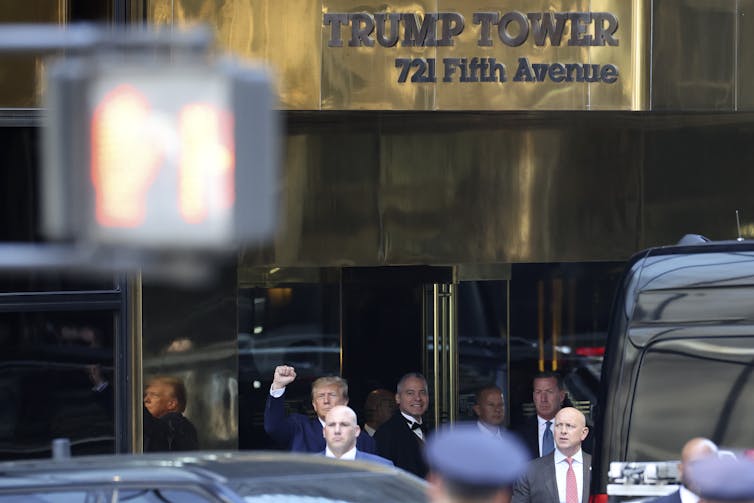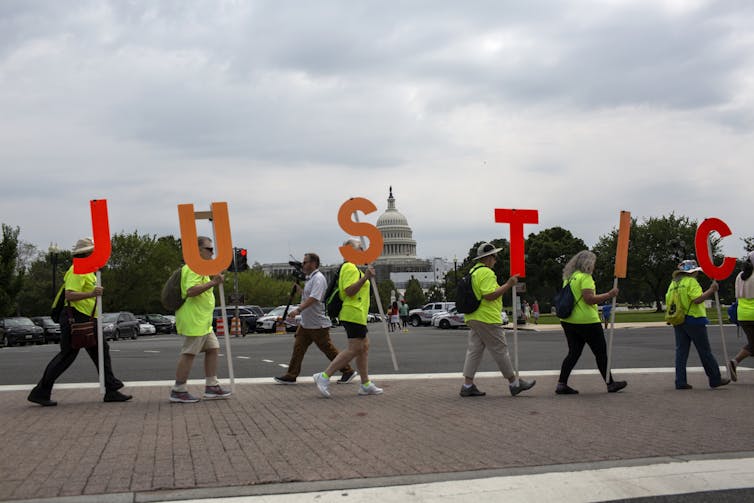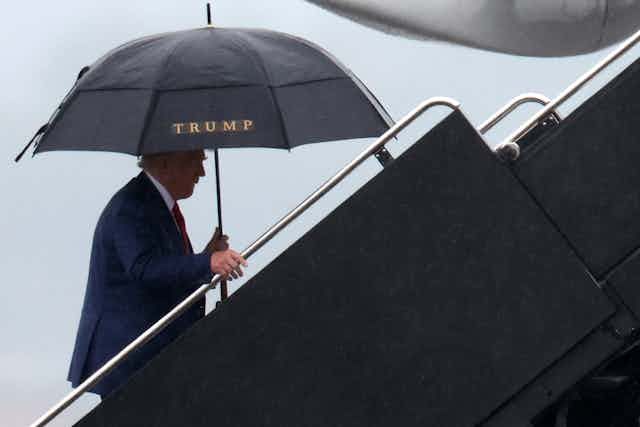Former President Donald Trump often complains that he is being treated unfairly by the prosecutors charging him with crimes.
Trump is now the subject of three federal and state criminal cases – and it is true that he is being treated unlike other criminal defendants.
The prosecutors are treating Trump a lot better than the average criminal defendant.
We are law scholars who have defended clients in criminal and civil cases, and we wish that our clients received the advantages that prosecutors are giving Trump.

Early warnings
Trump’s unique treatment began before he was even charged with any crime. First, he had ample warning of the investigations because he got letters from the Justice Department saying he was a target of each investigation. These letters were sent to Trump a few weeks before his two federal indictments in June and July 2023.
Especially in white-collar cases, criminal defendants sometimes receive target letters that warn them of an impending indictment and sometimes give them the chance to testify.
But target letters generally lack detail and are far from the norm across all criminal cases. Target letters are not legally required. The Justice Department spells out various reasons why its prosecutors do not need to send them, including risks of a defendant destroying evidence or endangering witnesses.
The difference freedom makes
After Trump was charged with crimes in each of his three pending cases, his lawyers negotiated dates when he could submit to authorities for processing.
And after Trump’s brief arraignments in court, judges found he was not a flight risk and released him.
Most criminal defendants are just arrested and taken to jail, where they may sit for months or even years while they await trial, unless they plead guilty. Three-quarters of federal criminal defendants are locked up to await trial.
It is hard for detained defendants to recover lost wages and from the humiliation they experience while in jail, even if they defy the odds and later win their case.
Pretrial detention has also been shown to result in a higher chance of being convicted and receiving longer sentences.
Indeed, defendants in courts across the country plead guilty to crimes even if they are innocent, in part because pleading guilty gets them home sooner. For some defendants, the pretrial detention is longer than their actual punishment will be, so pleading guilty resolves the case with credit for time served. But the stain of a conviction stays on their record forever.
Benefits of time and freedom
Because Trump is not sitting in jail, he is well positioned to ask that his trials be postponed far longer than would an ordinary criminal case. Federal law generally requires “speedy” trials, which are considered a right to protect defendants.
Trump got a lengthy delay, though it’s not as long as his legal team requested. Trump asked that his classified documents trial be held after the November 2024 election, but his trial is scheduled to begin in May 2024. Federal prosecutors pushed for a December 2023 start date. These kinds of compromise decisions are common in legal decisions like deciding court dates.
This timing gives Trump’s lawyers nearly a year to prepare arguments in his favor. They can easily meet with their client to do so, something that would be difficult if Trump were incarcerated.
Most criminal defendants face a very different experience.
For example, after federal prosecutors charged Air Force reservist Jack Teixeira in June 2023 for revealing classified information, he asked for provisions similar to those that judges made for Trump.
He argued that he, too, should be released to await trial. Teixeira did not have Trump’s wealth and easy ability to flee.
Nonetheless, the court determined that Teixeira poses a national security threat and must remain in jail. The case is still pending.
Other criminal defendants spend years in jail before pleading guilty or perhaps going to trial.
A treasure-trove of information
The differences do not stop there.
Prosecutors in all three of Trump’s cases have explained, in great detail, the allegations against him.
The classified documents indictment recounted several text message conversations between Trump aides and transcribed a conversation in which Trump disclosed the contents of classified documents and acknowledged their classified status.
The indictment regarding Trump’s alleged plot to overturn the 2020 election results was 45 pages long and included a play-by-play description of his plan.
Early in the documents case, federal prosecutors publicly disclosed key information about their investigation that could have helped Trump’s legal defense.
In contrast, criminal defendants typically do not know the precise allegations facing them this early in a case.
Prosecutors often withhold documents until the eve of trial or wait until after key witnesses have testified, all of which is legal. In some cases, they fail to disclose the information.
The other side of the coin
Prosecutors’ decision to treat Trump differently from other criminal defendants could serve a few purposes.
The Justice Department is prosecuting a former president. That puts the department in a delicate, high-profile position, where it has the “Herculean task of putting an ethical rope through a needle,” as one former federal prosecutor has said.
So, prosecutors’ detailed indictments help inform the public about the breadth and depth of the allegations made against Trump.
Their approach could add legitimacy to the prosecution’s and the Justice Department’s goal of maintaining accountability and independence while countering Trump’s perception that the cases are “a witch hunt” and rooted only in politics.

What would fairness look like?
Those looking for fairness in the criminal justice system may wish to see Trump treated like an ordinary criminal defendant. But instead, what if everyone else accused of a crime were treated more like Trump?
In that world, perhaps most importantly, pretrial detention would be used quite sparingly and would not provide leverage to coerce guilty pleas. People who are charged with a crime have not been proven guilty, and pretrial detention inflicts serious harm on defendants, their cases and their loved ones.
Prosecutors would tell defendants from the earliest stage of the case the detailed allegations against them so that defendants can prepare a meaningful defense.
The U.S. legal system aims at the truth, and robust procedures serve that goal.
In our view, the more thorough the judicial process is, the more confident people can be that it reaches the right outcome – whether the case regards Trump or not. Looking at Trump’s special treatment offers a good place to start in thinking about how the criminal legal system should treat all people accused of a crime.

